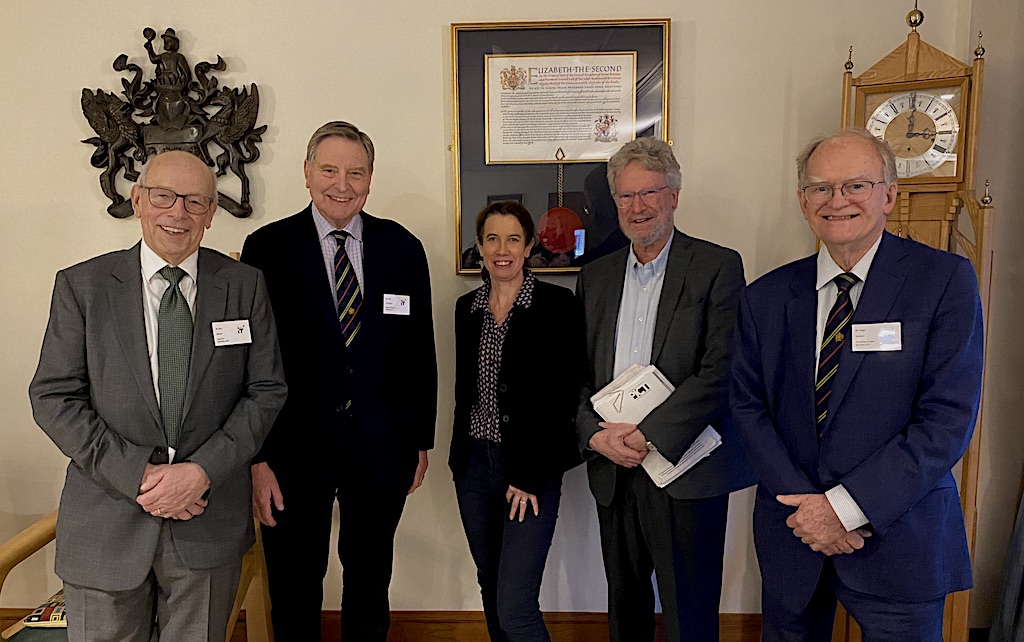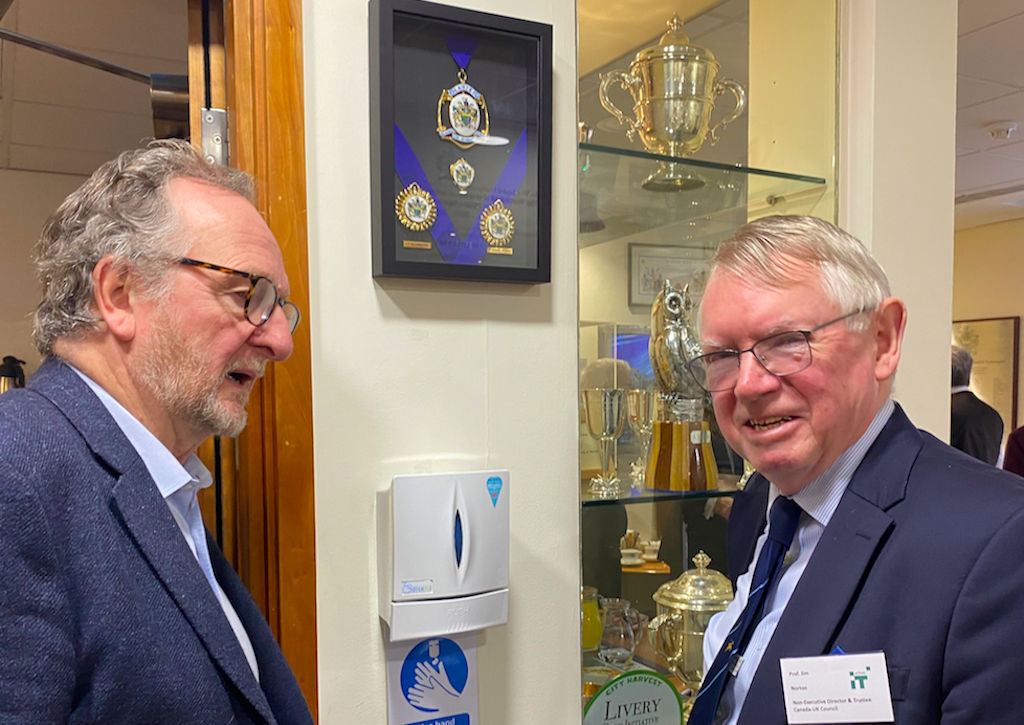
Professor Bill Dutton
Let me take five minutes to pick up a few themes that came up through the day. I’m really glad Chris brought up the Horizon scandal. For the past two days it has been headline news and it’s been called the broadest miscarriage of justice in UK history. Which was up to 900 sub postmasters pursued for fraud or fraudulent use of funds by the Post Office when it was potentially a combination of computer errors, Fujitsu and the Post Office’s mismanagement.
But we can’t really lose this opportunity as an important piece of history, of historical study. It began in 1995 when they rolled out [Horizon] and from 1999 on they began to see the problems with this and it’s only now that it’s become a very important aspect and well-known as the public are aware of it.
And one of the themes earlier was the importance of storytelling. And this dramatisation of Mr Bates versus the Post Office has been showing on ITV in the UK and people from abroad may not know about this but it’s absolutely riveting and it’s touching and now the UK is totally focused on trying to deal with what happened, why up to 900 people were pursued and there was actually suicides, mental problems and divorce as a result. And is only now really being addressed by top level management and government.
IT disasters
Several people in this room were part of the PICT [Prof Dutton was National Director for the UK’s Programme on Information and Communication Technologies] worked on the UK programme back in the 1990s. In 1995 we published a paper called Computer Power and Human Limits and it was looking at IT disasters and it said we should study these.
We looked at the London ambulance routing disaster. We looked at the USS Vincennes shooting down an Iranian domestic airliner because they mistook it for a military plane. And we had historical studies of exactly those IT disasters and tried to learn about what caused them.
Almost all of them came up with multiple reasons. It’s no single one explanation for any of these. It’s because multiple things go wrong. But historical studies and case studies of IT disasters such as Horizon could really help prevent these things from happening in the future.
We’ll have a tonne of material. We should have AIT say, okay, let’s explain this to people and take responsibility for showing who’s responsible for this.
Hindsight
Firstly, I loved Brian Sudlow’s use of the term hindsight. Everybody talks about hindsight in a pejorative way like, oh well, we can say that with hindsight. Well, hindsight should be used it in a positive way, I mean this is history after all. Hindsight is a great term that we don’t use enough, it’s a positive when we use the word foresight but why not use hindsight in that way.
Social implications
Secondly, the social implications. I started studying as a political scientist and I started studying the social and political implications of computing in 1974. And almost always, it was speculative. The social implications would be this would be that and now we can look back at the impacts actually that have occurred over time with women with work, with accessibility. And so we know that this is not happening or this is happening in ways that we did not predict. We can look at the social implications now from a historical perspective in a much more rigorous and interesting way than we could before.
Gaps in the history
Thirdly the gaps and everybody’s mentioned the gaps and what we know and the historical missing data and the missing archives and the disconnected archives.
I spoke in the early 2000s to a group of historians at Oxford and I was an internet studies person and I tried to get them really worried about the internet and how we’re not saving this material and it’s being lost and you won’t know the history and all the historians said, ‘Bill. That’s history. This is what historians do, that’s our work, that’s why you hire us to do these things, we work with missing data all the time’.
The Hype
And lastly, the hype. People have mentioned the hype and I think the hype around innovations, for example these smart cities that have had all these ebbs and flows of interest and AI likewise and then we forget about innovation all the time. I coined a term ‘innovation amnesia’ because people forget that you know video conferencing was then invented and failed about 20 times and then now it’s successful but hype has a real value.
You don’t get people interested in stuff like this until unless there there’s some hype and excitement.
I’m an emeritus professor at University of Southern California, but I came to the Oxford to be the founding director of the Oxford Internet Institute and the first Professor of Internet Studies at Oxford and my colleagues at Oxford came up to me and said, ‘what are you gonna do in a couple of years? Because the internet’s not gonna be here’.
So they thought it was all hype. And it wasn’t. Everything’s going to be more and more networked.
Applications and technology
Just a small point about how people were mentioning the focus on applications rather than technology. I do think that the internet was driven by the effort to share computing resources. So you could use a computer anywhere in the world [and be connected] from wherever you were. And that the web was driven by sharing documents so that at Cern they could have a global project and share the same documents so that is application driven and I think that new forms of AI based on large language models were really driven by the efforts to read the web. For example, military defence and how do we read these billions of things going on. It’s got to be automated and machine cognition has to happen.
And finally, I think the diversity of this group was just incredible. Everybody said how they got into this field from different angles and into the area of studying the history of the internet and IT and it made a very interesting conversation because of that.
One of the purposes of us putting this together was to help us network with other people who were interested in the history of the internet and IT and I think hopefully by doing this and maybe future events we can network people who are not necessarily expected to be in the same room or expected to have similar interest. So I thank AIT for doing this.
Professor Jim Norton

I will go back to 1948 when Winston Churchill pointed out to the House of Commons that, and I quote: “Those that fail to learn from history are doomed to repeat it.”
He was paraphrasing, in fact, George Santayana from his book The Life of Reason published in 1905, who noted that those who cannot remember the past are condemned to repeat it.
I think this thought provides the key reason for why the whole Archives of IT project and our conference today are both timely and very important.
There are so many lessons learnt over the past 70 years that later practitioners aren’t in danger of never having known, let alone forgetting. Each generation of computing, mainframe, mini-computer, personal computer, embedded systems, cloud: seems to have to relearn the need for things such as careful systems analysis and planning, let alone the need for the use of, for example, formal methods in software development.
I was there at the beginning of the packet switching revolution that led to Arpanet and BT’s experimental packet switch service and the package switch service to the internet we know today.
Little consideration to security
We gave little if any consideration to security. We were hell bent on providing the maximum access at interoperability. We certainly paid the price for that, in spam and spoofing. We’re in danger of repeating that pattern in the social and societal impacts of information and communication technology.
Our technologies continue to follow an exponential curve of growth in price performance and thus capability. Sensible managed social diffusion and adoption remains a steadfastly linear process. Lagging, I would argue, dramatically.
We didn’t fully comprehend what we were unleashing with social networks and social media. Are we about to face exactly the same challenges with generative machine learning tools such as ChatGPT and Bard?
Great value of Archives of IT
You will understand from this preamble that I firmly believe in the great value of Archives of IT. John [Carrington], Bill [Dutton], Tom [Abram] and the whole team are doing a great job in capturing the lessons and experiences of the past. Even more importantly, they are pioneering dissemination of that knowledge and material into our schools and universities.
Dead expertise, I would argue, is of limited value. It must be put back to work. How many of our children know of the key role the UK has played in the development of ICT? The role for example of Dr Donald Davis who I was honoured to work with at the National Physical Laboratory who arguably established the concept of packet switching and certainly pioneered its first implementations in this country. Or the role of the Royal Signals of Radar Establishment at Malvern in developing liquid crystal displays.
They may know about the contribution of Tim Berners-Lee to the World Wide Web. But what of his parents? His father Conway Berners-Lee helped John Pinkerton develop the Ferranti Mark I, the first commercially built computer. And his mother, Mary Lee Woods, was arguing the first computer programmer at Ferranti.
I would also argue, by the way, not on script, that as I recall from what we did in BCS many years ago at the start of the computing era it was more like a 50 50 [ratio of women to men] we managed to kill it.
In that working how many of us know of the pioneering work of Janet, the Joint Academic network and the European wide equivalent, GÉANT? All the work on data communications protocols carried out in the 1980s by the UK universities, the so-called coloured books. I think it’s important that we share role models and we share achievements.
What more does the archive project need to do? How can we make better use of the archive material we have? How can we reach out to schools, colleges, universities? Should we run further forums such as today? But as I close, will you please join me in thanking the whole team who have worked so hard to put on today’s forum and many thanks to you both here and online for joining us. Thank you.